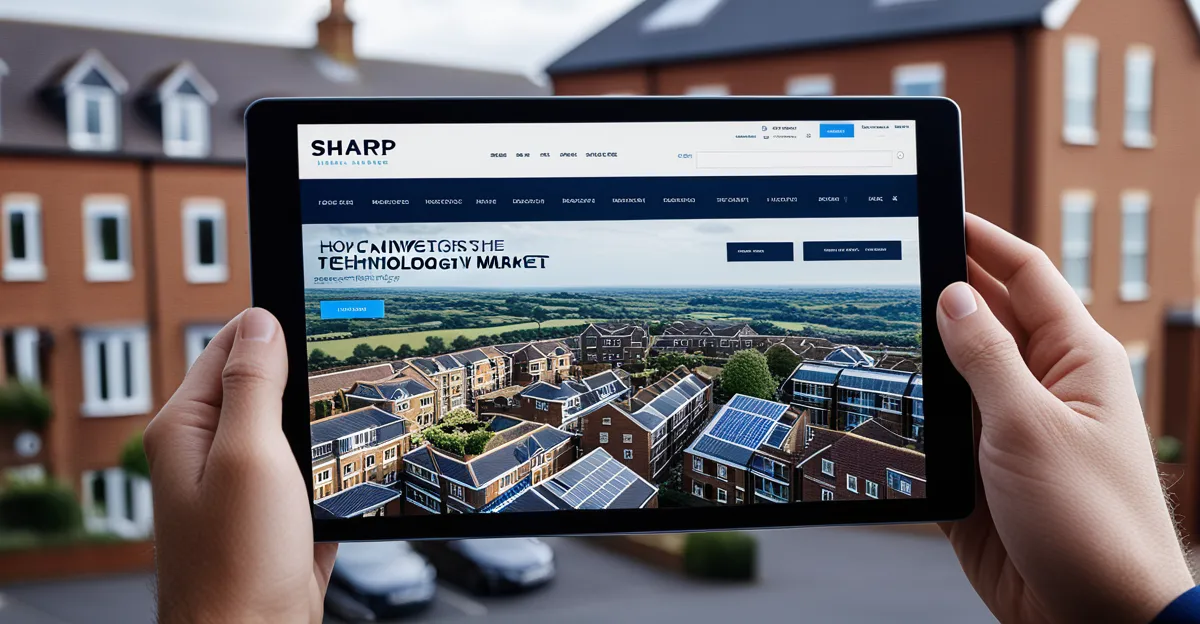Key Technological Trends Shaping the UK Real Estate Market
The UK real estate sector is rapidly transforming due to the increasing adoption of PropTech and AI-driven solutions. These UK real estate technology trends are revolutionizing property investment innovation by streamlining processes and introducing new efficiencies. PropTech applications now extend across the property lifecycle, enhancing everything from sourcing to management.
Digital platforms have seen significant growth, becoming integral to estate agencies. Their integration allows seamless communication, easy access to property listings, and efficient client interactions. This transformation is not just about convenience but also about empowering both agents and investors with real-time data and analytics, resulting in more informed decision-making.
Additional reading : How Can UK Real Estate Trends Influence the Stock Market?
Another key development is the emergence of blockchain technology. Blockchain’s role is increasingly recognized for enhancing transparency and security in real estate transactions. It allows for immutable property records and the potential to reduce fraud and transaction times. As these technologies merge, the UK prop investment landscape is becoming more dynamic, accessible, and trustworthy, laying a strong foundation for future innovations.
Practical Applications of Technology for UK Real Estate Investors
Digital platforms are reshaping how UK investors source properties and conduct due diligence. These real estate digital tools simplify search processes by aggregating listings and providing detailed property data, saving time and reducing guesswork. Platforms often integrate financial calculators and market analytics, enabling investors to assess potential returns with greater confidence.
Topic to read : What Innovations in UK Real Estate Finance Are Shaping the Future Market?
AI in property investing takes this further by delivering advanced data analytics. AI algorithms analyze historical trends, neighborhood factors, and economic indicators to produce accurate property valuations and forecast investment performance. This capability helps investors craft informed strategies tailored to market conditions, reducing risks associated with guess-based decisions.
Furthermore, blockchain technology has found specific property blockchain use cases in securing transactions. By creating a transparent, tamper-proof ledger of property records, blockchain reduces fraud and improves trust among parties. Smart contracts automate steps like payments and title transfers, speeding up processes and cutting costs. Together, these technologies equip UK real estate investors with tools to operate more efficiently, securely, and strategically in an increasingly complex market.
Case Studies and Real-World Examples from the UK Market
Exploring UK PropTech case studies reveals how technology adoption is reshaping property investment. For instance, startups specializing in virtual tours have enabled investors and buyers to view properties remotely, significantly reducing time and travel costs. Such digital-led transactions demonstrate the practical benefits of integrating technology into traditional estate agency practices.
Successful investor stories also highlight the value of technology adoption in property, where leveraging AI-driven analytics helped identify undervalued assets and forecast market trends more accurately. These real-world applications provide concrete evidence that embracing PropTech improves both efficiency and decision-making.
Another example includes platforms that combine blockchain with digital tools, enhancing transaction security and creating transparent property histories. This integration showcases innovative solutions that address common challenges in the market.
Overall, these case studies emphasize how investors utilizing advanced PropTech gain a competitive edge. They illustrate the transformational impact of technology and encourage wider adoption, offering insightful lessons on blending tech with conventional strategies for maximizing returns.
Benefits of Embracing Technology for Real Estate Investors
Embracing advanced real estate digital tools significantly improves investment efficiency by delivering precise data and analytics that support faster, smarter decisions. Investors gain from real-time market insights and automated workflows, which reduce manual errors and speed up processes like property valuation and due diligence. These improvements contribute directly to achieving a higher technology ROI.
Technology also enhances transaction speed, security, and transparency by leveraging property blockchain use cases. Blockchain creates tamper-proof records and enables automatic execution of contracts, lowering fraud risks and offering clearer property histories. This fosters trust among parties and streamlines the often-complex real estate transaction steps.
Access to detailed property data advantages empowers investors to explore broader markets and identify opportunities beyond traditional channels. AI-driven analytics and integrated platforms deliver comprehensive views of market trends and asset performance, reducing barriers typically caused by limited information.
In summary, technology adoption equips investors with tools to make informed, timely decisions while securing their investments. This blend of efficiency, transparency, and accessibility defines why digital innovation is essential for succeeding in today’s UK real estate market.
Challenges and Considerations When Implementing New Technologies
Adopting PropTech in the UK real estate sector presents several notable challenges that investors must navigate. One primary barrier is resistance to change; traditional investors and agencies may hesitate to fully integrate new real estate digital tools due to unfamiliarity or mistrust. Overcoming this requires clear demonstration of technology’s tangible benefits in efficiency and security.
Data privacy remains a critical concern in technology adoption issues. Property transactions involve sensitive personal and financial information, demanding strict compliance with regulations such as GDPR. Failure to address real estate data privacy adequately can result in legal repercussions and loss of investor confidence. Therefore, robust cybersecurity measures are essential.
Integrating new technologies smoothly with existing investment processes can also be complex. Legacy systems might be incompatible with advanced AI or blockchain solutions, causing operational disruptions. Investors need strategic planning to bridge traditional practices with innovative tools effectively.
In summary, managing PropTech challenges involves addressing cultural resistance, ensuring strong data protection, and facilitating seamless integration. These considerations are vital to successfully harness the full potential of technology in property investment innovation.
The Future of Technology in the UK Real Estate Investment Sector
Anticipating the future of PropTech is essential for investors aiming to capitalize on ongoing shifts in the industry. Current real estate technology trends suggest a continued expansion of AI capabilities, with more sophisticated algorithms improving predictive analytics and market evaluation. This evolution promises deeper insights for property investment innovation, enabling investors to identify emerging hotspots and optimize portfolios with precision.
Emerging innovations include enhanced integrations of blockchain beyond transaction security—such as tokenization of property assets, which could democratize access by allowing fractional ownership. Additionally, developments in virtual and augmented reality are expected to transform property viewing experiences, facilitating more immersive, remote tours that save time and resources.
To stay competitive, investors should monitor these trends, investing in platforms and tools that evolve with the market. Strategic adoption of scalable technologies ensures agility and readiness for new challenges. Ultimately, aligning investment strategies with anticipated real estate technology trends positions investors to benefit from higher efficiency, transparency, and market responsiveness as PropTech continues to reshape the UK property landscape.




